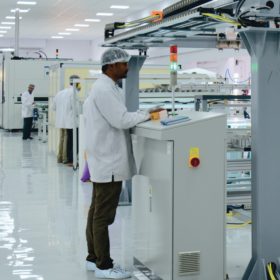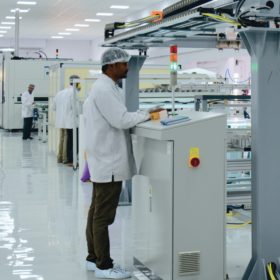Solar manufacturers in SEZs say customs duty will be counterproductive

Module manufacturers in special economic zones would be at a disadvantage when selling in the domestic market as they would be required to pay basic customs duty on the value of solar modules.
Leading solar manufacturers, including Webel Solar, Vikram Solar and Renewsys, have demanded a level-playing field for all manufacturing units to realize the true potential of the renewable energy sector under the prime minister Narendra Modi’s ambitious Atma Nirbhar Bharat Abhiyan.
The Ministry of Finance recently proposed to impose basic customs duty (BCD) on solar cell and module imports to encourage domestic manufacturing.
According to module manufacturers, the move is likely to impact the viability of manufacturing units located within special economic zones (SEZs) as they will have to pay customs duty on the value of solar modules–even if they are importing solar cells–whenever they sell within the domestic tariff area (DTA).
“Module manufacturers located in DTAs, on the other hand, would be required to pay BCD on the imported value of goods (cells) and won’t be liable to pay BCD on the value addition done in DTA, which puts them at an advantage compared to the manufacturers in SEZs,” said Vikram Solar CEO Saibaba Vutukuri.
The solar cell manufacturing capacity installed in SEZs is about 2,000 MW, compared to 1,164 MW in the domestic tariff areas (DTAs) or area outside SEZs. Module manufacturing capacity installed in SEZs is 3,825 MW compared to 5,053 MW in DTAs.
With 63% cell manufacturing capacity and 43% module manufacturing facility located in the SEZs, solar manufacturers expressed concern that the imposition of BCD would be counterproductive and harm the very industry for whose protection the measure is intended to be imposed.
“Therefore, if the government plans to levy BCD, it needs to ensure that manufacturing units in DTA and SEZ are placed on a similar footing in terms of customs duties and taxation,” said the manufacturers.
Renewsys global CEO Avinash Hiranandani said, “Apart from China, Malaysia and other countries, India is also a significant market for solar cells and modules for Indian firms, whether located in SEZ, export oriented unit (EOU) or DTA. No custom tariff was ever envisaged while investing in the manufacturing units in SEZ for clearance to DTA. It is thus important to protect the existing investment, especially in SEZ, by ensuring that in case SEZ units sell their products in DTA/Indian territory, they are liable to pay custom duties at par with the units in DTA and the custom duty implication on them is limited to an extent of benefits availed in terms of duties and taxes forgone, if any, whenever goods are cleared from SEZ to DTA and not beyond.”
S.L. Agarwal, managing director of Webel Solar, said, “By doing this, the government will ensure that the manufacturing units located in DTA and SEZ are placed on a similar footing in terms of customs duties and taxation. This will help India to achieve its renewable energy targets and help the government to achieve “Make in India” initiative. Also, the manufacturing units located in SEZ would be able to export as well as cater to the domestic market, hence achieving economies of scale.”


